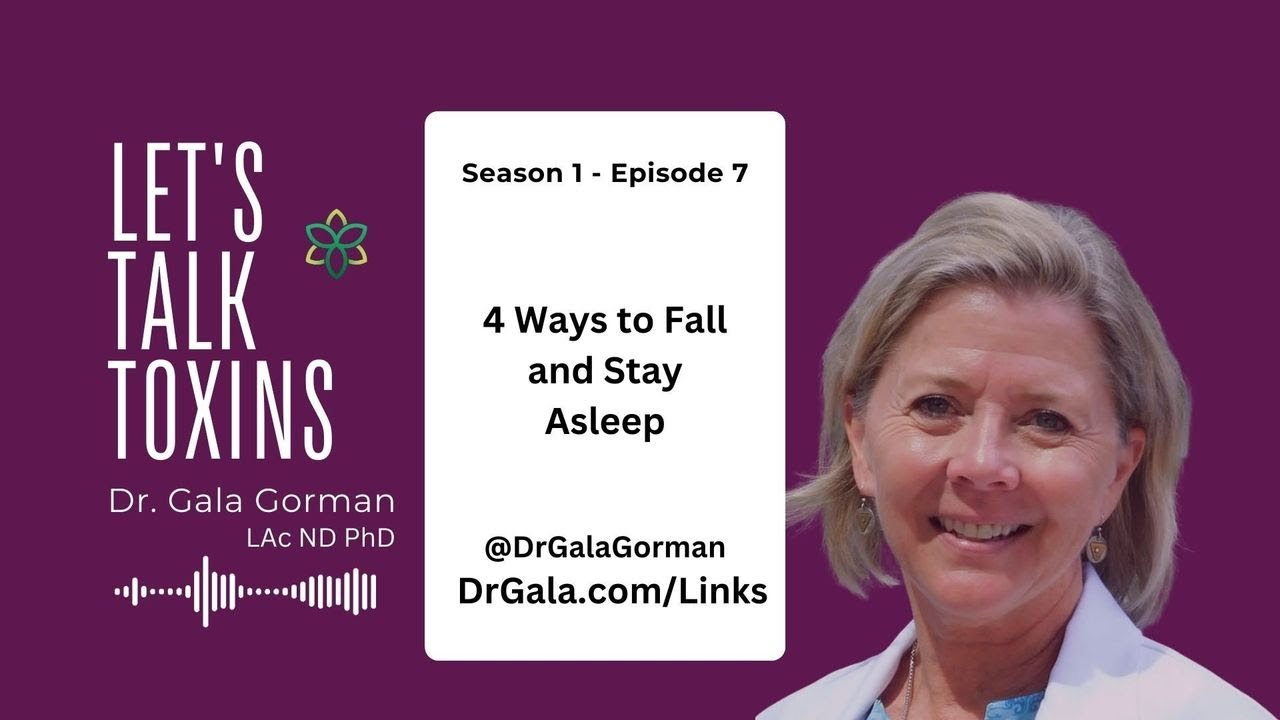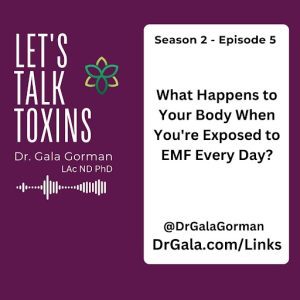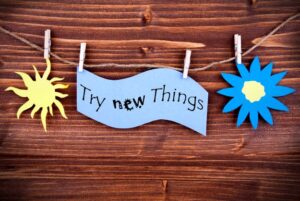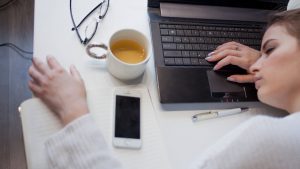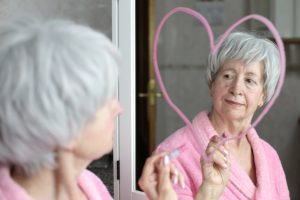NOTE: A machine generated this transcript. Please be aware that it may contain occasional errors in punctuation and spelling.
Your sleep is one of the ways that you maintain health. It really is non-negotiable. If you’ve got something going on in your environment that is keeping your nervous system on alert, it’s an issue that you’re going to have to address. It’s possible for the first night or two that you won’t sleep very soundly.
Welcome to the Let’s Talk Talks and Show! Imagine drifting off to sleep easily and staying asleep all night. In today’s episode, we’re discussing 4 Ways to Fall and Stay Asleep. If you ever struggled to get a good night’s sleep or found yourself waking up multiple times during the night, you probably felt groggy and tired the next day. These could be signs that your sleep habits need a little attention.
In this episode, I’ll discuss what works and what doesn’t. If you’re new here, I’m Dr. Gala Gorman, a licensed acupuncturist, naturopath, and author of “What’s Your Kryptonite?”. I wrote the book to help women understand the effects of chronic stress that’s turned toxic. In the book, I shared the MOLT Method™ I developed to make it easy to shed stress along with the accumulated toxicity, just like any other creature in nature that’s outgrown its trappings. So that you can cruise through midlife and beyond symptom-free. So that you can put an end to health issues like chronic fatigue, insomnia, mood swings, and even weight gain.
MOLT, in this case, is an acronym. The T stands for toxins. I can say with confidence that every symptom is caused by accumulated toxicity. I evaluate 12 categories of toxicity when I’m working with someone to unravel the health mystery. Our world is full of man-made substances that our bodies were not designed to deal with. Coupled this toxicity with an overwhelming amount of toxic stressors the body was designed to manage, and it’s no wonder women find themselves playing whack-a-mole with symptoms.
In this segment, I share information from research studies related to toxicity. You can think of it as a Toxin Trend. In this report, there’s a great example of what I refer to as a toxin trend. The University of Oklahoma researchers discovered persephacin, as a promising new antifungal molecule. It’s really effective against various fungi and less toxic to human cells than some of the other treatments that are commonly used.
To understand better what actually would be considered a fungal infection, something like a candida or yeast would be considered fungal, and so fungal toxicity is one of the 12 categories of toxicity that I evaluate. This breakthrough addresses the growing threat of deadly resistant fungal infections. The team used innovative methods to study plant-dwelling fungi, leading to a US patent and potential new treatment options.
If you’ve got issues with the immune system, the immune system can be really vulnerable. Women undergoing treatment like chemotherapy or even organ transplants – I have a good friend that had an organ transplant and she has to take medication for the rest of her life that suppresses her immune system. In these cases where people have weakened immune systems, it makes them more susceptible to potentially developing fungal infections.
The study highlights the importance of developing safer antifungal treatments. If you are trying to reduce toxicity, and you should be, the newly discovered antifungal molecule, this persephacin, is reported to be reasonably non-toxic to human cells. That’s particularly significant for women’s health because many current antifungal treatments are really toxic to the human body. Essentially, you may be addressing one type of toxicity, but it’s creating problems in its wake.
It has really broad spectrum, effectiveness, at least that is what the initial signs are indicating. This persephacin appears to work against a wide range of infections that are related to fungi, fungal origin, and it could potentially benefit women suffering from any type of fungal infection, including the most common, like I mentioned previously, a yeast infection or candida overgrowth.
This is just a really important development. If you have found yourself taking any sort of medication for a fungal infection, it may have created sort of collateral damage. This is a promising option. There are some other things you can do to really address particularly yeast infections that are more natural. I encourage you to consider that if you have any sort of recurring problem like this.
Chapter 12 in my book, “What’s Your Kryptonite?” is dedicated to helping readers manage what I refer to as Tricky Toxins. Our bodies are bombarded with toxicity, so we have to learn to manage it. Just comment “tricky toxins,” and we’ll send you a link where you can download the chapter for free. If commenting isn’t convenient, go to DrGala.com/Links and sign up for my wellness weekly newsletter. You can respond to any email you receive from me with “tricky toxins,” and we’ll send you a link.
The next segment I refer to as “Walking My Talk.” Every suggestion you’ll hear from me has been tested in the trenches. That includes saying no to symptom suppression. Over the past four decades, I’ve developed processes that work sustainably. Typically requires a combination of approaches that I’ve synthesized to address the health issues that show up repeatedly for many women.
In this segment, I’m opening the kimono to share how I was challenged to apply my suggestions. I’m walking my talk and here’s an example:
If you’ve been following along, I shared my story that I kind of let things get a little out of hand with the summer festivities, essentially eating vacation food for a little too much of an extended period of time. I let things accumulate. I used my Human Energy System Reboot, which is a one-week process, and I really felt some improvement just in the few days that the reboot lasts. Because I let this go too long, I really just had to extend the reboot to a full-blown reset.
What does that mean? That means that I really need to continue in earnest practicing the seven ways. I also introduced one of my customized protocols to address the toxicity that had built up to support my body in releasing that and returning to homeostasis, which is optimal wellbeing. I really learned, hopefully really good lesson, and I just wanted to share it with you that you just don’t want to wait too long. We have an internal set point and our body really will return to that set point easily.
If we haven’t extended things beyond about probably six to eight weeks. Because I went double or triple that period of time, my set point kind of adjusted. Now, I’ve got a much more challenging job to readjust my set point. If it took four to six months to adjust my set point in the wrong direction, it’s going to take a similar period of time to readjust my set point back to where I prefer that it stays.
It was a really great experience just to apply my own reboot and the seven ways and five plays and to use them as I saw fit depending on what I had going on. I can really recommend to you that this reboot is something that would really help you. Honestly, it’s so low cost. It will be something that you’ll just have in your home apothecary toolkit to use anytime you need it.
Now let’s talk about the 4 Ways to Fall and Stay Asleep. When I’m done drop a comment and let me know if you struggled with sleep issues and what’s helped you improve your sleep quality.
The first thing I want to talk about here is sunset lenses. These are blue blocker, blue light blocking glasses. In particular, the sunset lenses are the orange tinted lenses. I will admit that these lenses are not really what would be my preference, but I really love getting a good night’s sleep. So it’s worth it to wear these blue blocker sunset lenses in the evening.
The evening light triggers melatonin production. When we’re not exposed to the normal light that is typically experienced from the setting sun, we’re working on the computer, we’re on our devices, we’re watching a big screen TV. All of those things are interfering with our melatonin production.
On a side note, if you’ve got kids that are playing games on their devices well into the evening, and you find that they’re struggling to get a good night’s sleep, kids should not be struggling to get a good night’s sleep. Their melatonin production should be working flawlessly. If that’s not happening, they need to get off the devices too.
Anyway, that was just a side note, my heart goes out to some of the young people who are developing some of these issues at way too early of an age. If they are not sleeping well, that’s going to lead to issues with weight gain related to metabolism, with auto-immune conditions, potentially including type one diabetes.
It may sound farfetched, but I will tell you that this is a really critical component to really support your body’s natural melatonin production. One of the best ways to get this natural evening light exposure is to take a walk after dinner or as you’re winding down. Now we’re heading into winter and so it will be fully dark by five o’clock. It makes it a little more difficult to do this in the winter. But if you can walk outside in the evening light, it really will trigger that natural melatonin production.
The sunset lenses, the orange tinted lenses are really great if you’re going to watch TV or be on devices into the evening. If you are doing that past about eight o’clock at night, which most of us are, then you need to have sunset blue-blocking glasses and you need to use them. Leaving them sitting on the shelf is not going to help much.
Next, I want to talk about what’s referred to as early time-restricted eating. What’s supposed to happen when our body gets triggered for sleep is all the processes that normally function during the daytime that are taking a lot of energy. Digestion being one of them, that process essentially is supposed to shut down at night. It takes six to seven hours for food to leave our stomach and get through our small intestine.
The small intestine is where things are separated and basically the nutrients are extracted to create energy in our body. If your last meal was very close to bedtime, then it’s not surprising that while your melatonin production may have kicked in so you may fall asleep okay, you’ll find that you’re waking up a few hours later. That’s because your body is still trying to wrestle through this digestive process. It’s not able to kick in that rest and repair process that’s supposed to happen in the middle of the night.
Early time-restricted eating really frees up resources. If you are one of those people that struggles to stay asleep, particularly, then this can be extremely helpful. I recommend that you try it. It’s an experiment, but try having your last meal no later than 3:00 PM and try that for a week. You can get away with a lot. I call it the “cheater’s diet” because you can get away with a lot if you consume it before 3:00 PM. But I obviously recommend that you eat a really healthy nutrient dense diet. Try having your last meal and being done consuming food and anything with caffeine in it by 3:00 PM.
Next, we’re going to talk a little bit about the environment, your sleeping environment. We have natural circadian rhythms that when we move into this period of time where our body is naturally sort of adjusting for rest and repair, which is what sleeping is, then our circadian rhythm triggers this cooling process. The body is supposed to cool down. If that is really challenging because the environment is too warm, then it can really create a problem.
I know a lot of times I feel really chilly going to sleep because we have an air conditioning unit that just cools the bedroom, which is really nice so that we don’t have to cool the whole house. I’ll go to bed, and I’ll feel really chilly. Sometimes, I’ll even use a heating pad, but what I find is that I can go to sleep on the heating pad, it feels really good, but then I’ll find that I need to get up and turn the heating pad off. And then, sometimes, because I’m too warm from the heat, I’ll have a hard time falling back asleep.
It’s really great if you can avoid doing that. I find that most evenings, I just avoid using the heating pad, and within a few moments of getting into bed and snuggling under my covers, I find that I am warm enough and comfortable. The only issue potentially is that in the middle of the night, if the body heat sort of accumulates due to your mattress or something else you’ve got going on in the bedroom, then it’s possible that you kind of get to the point where you’re warm enough, where your body then triggers that it must be time to be done sleeping. And you’re thinking, “Heck no, it’s like two or three o’clock in the morning. I’m not done sleeping.”
It’s really challenging sometimes to go back to sleep and I’ll find that if I can cool the bedroom down a little bit, it’ll trigger that sleep response again. And I’ll be able to go back to sleep. If I’m sleeping in a foreign place, like a hotel room or something like that, and I’m really struggling to get the temperature regulated, then this is one of those things that I find, I’ll wake up in the middle of the night and the temperature is too high and I’ll really have to cool it down and then wait for that process to happen.
The environment needs to cool down, and then my body needs to recognize that the environment has cooled down. So then we may end up being awake for an hour or two, which is extremely frustrating and is going to spill over into the next day.
How does this happen? Melatonin production actually contributes to heat loss, particularly in your hands and feet. If you go to bed and you feel like your feet are cold, then know that that’s a good sign that your melatonin production is kicking in. Just try to go with it. I will say that if it’s extreme, you may be better off putting on socks, at least for a period of time so that you can really relax and fall asleep. You may need to pull those socks off in the middle of the night whenever you find that you are feeling warm enough and that your body has kind of regulated itself to the sleeping temperature.
I have a couple of things I still want to share with you so that you can sleep like a baby again, but remember you can get the Tricky Toxins chapter of my book “What’s Your Kryptonite?” for free. Just comment “tricky toxins,” and we’ll send you a link where you can download the chapter for free. If commenting isn’t convenient, go to DrGala.com/Links and sign up for my Wellness Weekly newsletter. You can respond to any email you received from me with “tricky toxins,” and we’ll send you a link.
Now let’s continue with a couple of additional things I want you to know about restoring sound sleep, and don’t forget, when I’m done, drop a comment and let me know if you found ways to improve your sleep and how you did it.
One of the other things that’s really important to recognize is that our nervous system needs to be soothed. We need to be calm. We need to have our parasympathetic nervous system versus our sympathetic nervous system active for sleep. That’s what’s required for rest and repair. It’s required for rest and digest as well. The way we activate the parasympathetic nervous system is by activating the vagus nerve or essentially rebooting the vagus nerve.
The vagus nerve is a nerve that goes down both sides of your neck all the way to your gut essentially. It really controls your entire nervous system. If you find that you’ve got overthinking happening in the middle of the night, or you really just feel anxious, then your nervous system may not be calming down like it needs to.
Some of the things that will help here include a weighted blanket. You can search for that online if you’re interested in finding out what your options are. I will say that lean on the side of less weight, you really only need a slight amount of weight to sort of soothe your nervous system and generate that feeling of being safe and protected, kind of in a cocoon. That can be really helpful if you are feeling like it’s not really safe, and sometimes this is not logical. It doesn’t make sense.
Maybe there’s nothing in your environment that would make you feel like you’re not safe, but this could carry over from the day. If you had an encounter that really was problematic, if you’ve got something else going on in your world that just always has your nervous system under stress, then don’t be surprised if that’s carrying over into your sleeping period.
The other thing too, is sleeping companions. If you have pets or a mate that snores, for example, just constantly being interrupted can really be a problem. I realize that it’s a real conundrum because you may have become accustomed to sleeping with your pets, or you may love your mate and don’t want to have to disrupt that relationship because they are not a sound and quiet sleeper, but your sleep is one of the ways that you maintain health.
It really is non-negotiable if you’ve got something going on in your environment that is keeping your nervous system on alert. Then really, it’s an issue that you’re going to have to address. One of the things that I’ll point out here is many people, if they’re just sleeping in an uncomfortable or even unusual environment, say for example, you’re traveling and you’re sleeping in a hotel room that you’re unfamiliar with, it’s possible for the first night or two that you won’t sleep very soundly.
Those are the kinds of situations that really demonstrate to you how important it is that you have a really comfortable, safe feeling environment. If you find that you’re a light sleeper and you’re really sensitive to the environment, then it will serve you well to spend some time really working on that.
The other thing too, is that we need to really understand what’s happening if we’re having challenges sleeping. Are you having a problem falling asleep? Or are you having a problem staying asleep? Our bodies are hardwired to sleep between 11:00 PM and 5:00 AM. I’ve created lots of videos on sleep.
And so I’m not going to really go through a lot of the detail here, but just trust me. We’re hardwired. Our circadian rhythms are designed for us to sleep between 11:00 PM and 5:00 AM. And so I will say that if you are waking after 5:00 AM and you’re finding that you’re just feeling pretty awake, but you feel like maybe you didn’t get enough sleep. I would encourage you to just go ahead and get up. Because you’ll then feel more tired in the evening and that’ll be easier to adjust to this 11:00 PM to 5:00 AM period of time. If you are having trouble falling asleep, that is a melatonin problem.
And that problem is solved by the blue blocker, sunset lenses, and really taking care of the evening period leading up to sleep. But if you’re finding that you are waking up between about 1:00 AM and 5:00 AM. This toxicity, particularly with the liver and the lung. Both of these organs are really integrally involved in filtering your blood. And so if you’re waking up during that period of time regularly, and really struggling to go back to sleep, then it’s a clear sign that you have a buildup of toxicity that you really need to address.
The answers I give to questions I received quite often apply to and would be helpful for most women. I have accumulated a few related questions and I’ll answer them in this segment, Ask Away. If you’d like to ask a question, I created a form so that it’s sure to get answered. And your question could be shared in a future episode, helping many other women.
So comment, “QUESTION”, and we’ll get you a link to the form. If commenting isn’t convenient, go to DrGala.com/Links and sign up for my Wellness Weekly newsletter. You can respond to any email you received from me with “QUESTION” and we’ll send you a link.
How can I create a safe and calming space conducive to better sleep?
First of all, you want to eliminate the electronics in the bedroom. And I mean, really, eliminate them. That includes even an alarm clock. And so many people now use their phone as their alarm, which means that they have to leave their phone on and not even on silent. And so that’s really problematic.
I got a battery-operated clock many years ago, and that is the only clock we have in the bedroom. Fortunately, we really don’t need to use an alarm because we wake up naturally because we do a good job of managing our circadian rhythms and our sleep habits but if you are still using your phone for an alarm, then I suggest you find a better way.
You want to get the TV out of the bedroom. You want to get as many electronics out of the bedroom as possible. If you’ve got things that are relying on bluetooth, those things are pinging the router and the internet all night long. So that’s just best… out of your life, honestly, but we, none of us can really do that.
We’re all dependent on it, but for certain you do not want that interfering with this delicate process that’s going on in your brain that is essentially keeping you asleep and able to do the rest and repair work.
There is also benefit from having a super comfortable bed. And so there’s a reason why they call it a heavenly bed, right. At some of these nicer hotel chains and so really investing in a really comfortable bed and linens that just feel really yummy to crawl into can make a big difference and really improve your sleep more than you would think.
It’s really important to keep your linens clean, make sure you’re washing them at least every week. And keeping that fresh and the dead skin cells and all of that that ends up in our linens. It’s really important to just make sure that we’re keeping the environment clean.
And then lastly, just make sure that environment is cool. And that you’re supporting your body’s natural desire to cool down in the evening that triggers a lot of processes that basically help us stay asleep during the night and kind of shut down all the body processes that are not absolutely necessary to keep us alive so that we can do rest and repair work.
And so keeping the bedroom cool at night, and that means cool, you know, between 65 and 68 degrees. So, you need to find a way to make that happen. We have a special air conditioning unit. That just cools the bedroom because I didn’t want to have to cool the whole house to that degree. And that works really well for us, but depending on what your environment is and how you’re set up, that may not work for you.
Are there any specific brands or types of magnesium you recommend?
Calm is a powder form, it’s C-A-L-M just like it sounds. A powder form of magnesium that works kind of like Alka-seltzer. You just take like a tablespoon of it and put it in some water and it kind of bubbles up and dissolves.
And if you find that you wake up in the middle of the night and you’re having any sort of symptoms that point to a magnesium deficiency like muscle cramping or something like that. Then Calm is really great because it acts fast, and the other thing is that it’s got natural sweetener in it.
So if you’re finding that maybe you had your last meal earlier, as I recommend, early time-restricted eating, and maybe your body’s just having a little bit of a difficult time adjusting. We want to adjust from sugar burning to fat burning. But sometimes that adjustment is really difficult, especially if our liver is a little overloaded. And so just that little bit of sugar in the calm can help to sue that process as well. So calm works really fast and can help you get back to sleep.
If you are taking magnesium during the day, I recommend ionic magnesium. That is I-O-N-I-C and ionic magnesium is liquid. Honestly, doesn’t taste that Great. It’s not horrible, but it is easier for your body to metabolize and to get work into the process that it needs to work into in order to really be assimilated and be beneficial. So that’s just my recommendation. I have some specific formulations that I use depending on what my patients need and what their situation is calling for at the time.
But these two things are easy to get your hands on if you’re not working with me directly, just know that I never recommend using a supplement long-term. Even something like magnesium, we should be getting our nutrients, the raw building blocks that we need to make energy from our food, and what we’re consuming. If we are supplementing, it’s really easy to get things out of balance. And then that can create additional issues that then have to be mitigated.
It can also make it really tough to sort of get to the bottom of what’s gone haywire if you are supplementing with things that you don’t really need.
How often should ETR be practiced to see significant improvements in sleep quality?
So, what is ETR as a fasting variation? Well, early timer-restricted eating is essentially being done with your last meal by 3:00 PM. Your body is hardwired to consume food between 7:00 AM and 3:00 PM. I typically recommend that you make that period of time, maybe one meal between 10 and 11 and your main meal between two and three.
And so especially for women that, if you want to be able to eat a normal meal and not really worry about calorie restriction. Then, this is the best way to have your diet be pretty forgiving, where you can pretty much eat what you want. You just make sure that you do that during this period of time when your body is naturally designed to be able to digest what you’re consuming. And so you can get away with a little bit more. The later you go, the less you’re going to be able to get away with.
And so I will say that if you’re one of those people who really just has to eat later in the day, for any reason, including just your schedule. Then just know that that evening meal needs to be really high protein. And so that means something like turkey salad or tuna salad, a little steak or a chicken breast, or a piece of fish, like something that is really pretty much just pure protein, maybe a little garnish of a vegetable.
But you’re going to have to be much more mindful about what you’re eating in the evening. And the question here was how long is it going to take to see the improvement? Well, it really depends on how long it’s going to take your body to adjust to burning fat for fuel, honestly. And so that can take anywhere from really just a few days. We often see really significant improvement in my 10-day Human Energy System Reboot.
So it’s really common to see a difference in just a few days, but it could take really a matter of weeks to see some accumulating benefits and to feel like you’re not really missing that evening meal. You are going to have to probably adjust your lifestyle and adjust your relationship to food and how you’re consuming it.
And so, creating new habits takes typically six weeks or so. That would probably be a realistic expectation. I also typically recommend to my patients that they have a splurge day, one day a week. And it’s going to depend on how much you really have that you’re trying to accomplish. If you feel like you’re pretty close to your goals, then you can splurge pretty extreme. But you’re going to find that once you get all this toxicity and the processed foods and the unhealthy things out of your diet, you’re really just going to want to feel good.
And you’re going to find that even your splurge day doesn’t even compare to maybe a splurge day that you had before you adopted some of these improved lifestyle habits and modifications. So, early time restricted eating is really helpful in the short term, but then the benefits really accumulate as you continue it for weeks and months.
What is the optimal temperature range for a bedroom to enhance sleep?
Well, I think that the best way to put it is that it’s too cool for your activity during the day. So you may have noticed the air conditioning companies called 72 degrees. Well, there’s a reason why they call it 72 degrees because that’s the common temperature that most people prefer in their indoor environment. I will say that we keep our indoor environment at 74. We like it a little warmer. I don’t like to feel like I’ve got to go around with a jacket on all the time.
You know, if you really have to dress in layers and wear suit jacket and that sort of thing, obviously you’re probably gonna want to have it a little bit cooler. But at night, that temperature needs to be more like 65 to 68 degrees. It’s going to feel cool initially and it should feel cool initially. It’s best if you can isolate the environment so that you don’t have to cool the whole space. We’re fortunate to have an air conditioning unit that just cools the bedroom. I closed the door on the bedroom and it gets nice and frosty in there. And when I go in there, it feels a little chilly up first until I kind of snuggled up underneath my comforter.
But it really enhances my ability to fall asleep and then, really importantly, to stay asleep.
How can we minimize noise and light pollution in our sleeping environment?
Well, noise and light are the kind of things that you might find you can fall asleep with that kind of noise happening. Like, my husband likes to remind me that he fell asleep at the Kentucky Derby many years ago. So, I mean, who falls asleep with thousands of people around at the Kentucky Derby, but you know, I’m sure you’ve seen people.
It tends to be men that just can kind of tune everything out and fall asleep even with a lot going on. It’s also possible, we know that if we’re tired in the afternoon, we may take an hour or two nap in the afternoon and it’s light outside. And so it doesn’t make sense.
Like why sometimes are we super sensitive to light and sound? And sometimes we’re not, and it’s just a different trigger essentially when we’re shutting down to sleep for the night. And so, if you find that you have noise in your environment, then you’re gonna want to use some kind of white noise machine. Our little air conditioner that we have that cools the bedroom. We have it set so that it runs all night.
The compressor comes on and off, but we really don’t even notice that happening because it’s constantly blowing air. So that is our white noise in the bedroom. If you find that you’ve got some kind of light that you really can’t control in your sleeping environment, then find a really comfortable mask.
Many years ago, I was between places to live. I ended up living in an apartment. I didn’t realize when I looked at this apartment that there was a light pole right outside the bedroom window, and it was a security light. There on purpose, but it was nearly impossible to really block the light out there. I found that even putting up blackout fabric around the light, it still bled in from the sides. I ended up having to sleep with a mask on. Which was not optimal when you really don’t want to have to sleep with a mask on if you don’t have to.
But if it’s disturbing your sleep, then you really need to do whatever it’s going to take to make sure that it’s dark and that it’s cool. And that you don’t have essentially obnoxious noises that you are trying to manage.
One more thing to remember is that you really need to eliminate the electronics in the bedroom. Even just a clock or any sort of electronic often has some sort of little blue light or red light. And if those things don’t shut off and stay off, then that electronic needs to be either covered up or removed from the bedroom entirely.
And remember, If you’d like me to answer your specific question, make sure to comment “QUESTION,” and we’ll send you a link to the submission form. You’ll want to subscribe to the channel notifications to get regular updates. And that’s a wrap for this episode. This has been the Let’s Talk Toxin show. Make sure you subscribe to my channel on YouTube and activate the notifications. You’ll get a reminder when I’m going live next until then. Be well.

